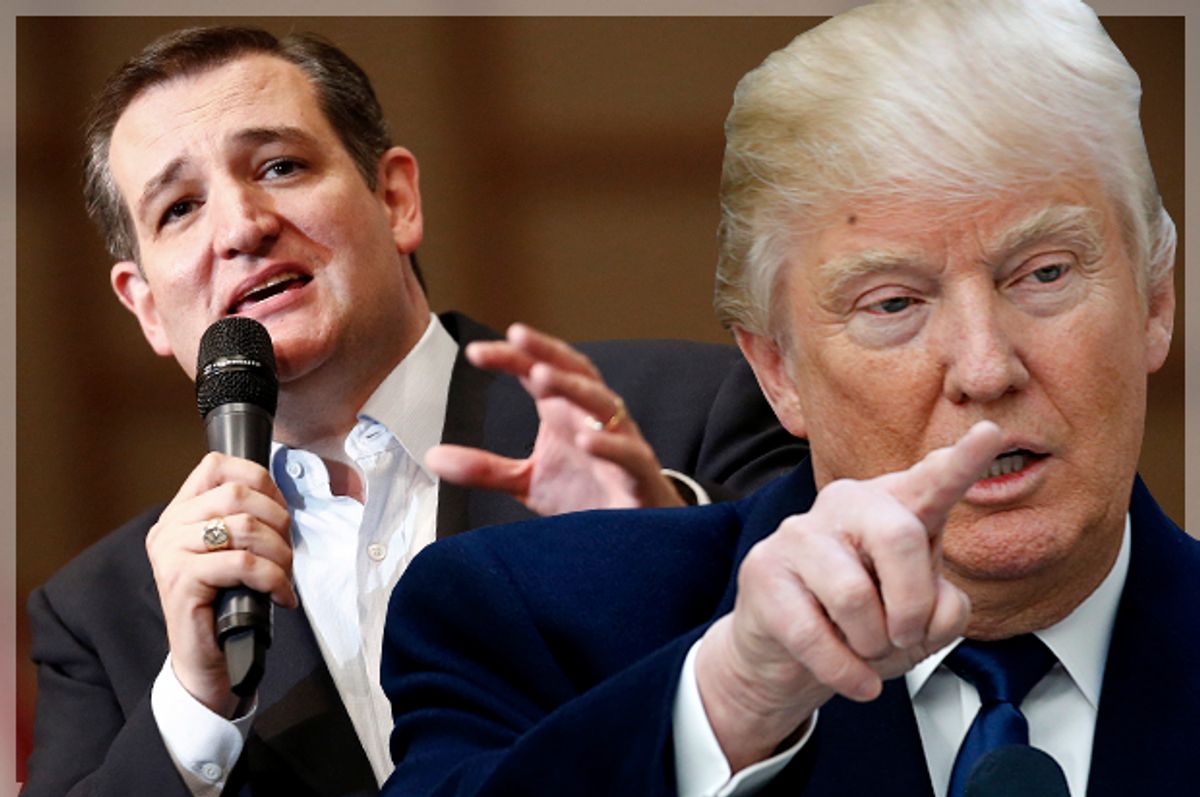You had to know Ted Cruz’s ego would not allow him to just go back to his day job in the Senate like a normal person after suspending his presidential campaign last week. Though to be fair, it is not as if being a senator is a full-time job these days, and all his co-workers hate him and probably don’t want to sit with him at lunch anyway.
News broke on Monday that while the campaign for the presidency may be over, the Texan’s supporters still plan to try and influence policy by making sure the GOP’s platform -- a statement of policy goals and principles that parties adopt at their conventions and then promptly forget about when it becomes convenient to do so -- reflects strong conservative ideology. These supporters, led by former Virginia attorney general and certifiable arch-wingnut Ken Cuccinelli, are very concerned that Donald Trump will inject a healthy dose of liberal policy into the platform, making it indistinguishable from a Eugene Debs fever dream, or something.
This fight is a sort of rearguard action by the Cruz forces. The candidate spent the last weeks of his campaign collecting delegates with which he hoped to stack the committees that will oversee the drafting of the GOP platform and the rules that will govern the convention. The hope was that, in conjunction with his strategy to deny Trump 1,237 nomination-clinching delegates on the convention’s first ballot, he could somehow grab the nomination for himself on the second ballot or later.
With the nomination dream dead and gone, a fight over the platform is Cruz’s way of remaining relevant. It allows him to cast himself as the savior of conservatism, the last honest conservative man protecting the cherished ideology from charlatans like Trump and the GOP establishment that rolled over and allowed Trumpism to take over the Republican Party. And Cruz loyalists, still seething at his brutal loss to a swirled mound of orange custard, are eager to help.
To the extent that there is a larger takeaway here, it is that, once again, Ted Cruz misunderstands the moment. Trumpism is not an ideology. It is a feeling. The Orange One’s fans do not care as much about the shibboleths that conservative intellectuals have dryly expounded on for years – tax cuts for millionaires, a free-market economy with little to no regulatory oversight, legalized discrimination against gay and transgendered people – so much as they care about shooting a giant middle finger at elites in the media and politics whom they feel look down on and condescend to them.
Still, if Trump gets crushed in the general election, Cruz may think he is positioning himself as a leader of the GOP, which he’ll claim to have earned as the keeper of the conservative flame while all around him, other Republican leaders gave in and followed Trump. He can spin the brief detour into Trumpism as the party temporarily losing its collective head. Once the demons have been exorcised, and whatever liberal ideology Trump tried to smuggle into the party is gone, Republicans can get back to the business of screwing over minorities and poor people.
Right now we’re seeing what looks like a total crack-up of the Republican Party and the long-awaited unveiling of conservatism as a sham ideology. And Lord knows it is fun to watch longtime Republicans burn their registration cards like college students burning draft notices during the Vietnam era, or scramble desperately for a third-party option, or sit out this summer’s convention in a huff. Watching people like John McCain and Kelly Ayotte try to save their jobs by “supporting” Trump without “endorsing” him will be must-see TV for the immediate future.
But even if GOP pols get wiped out in down-ballot races to go with a loss in the presidential race, it is likely that the Republican Party will be fine, at least in the medium term. The party still controls 31 governor’s mansions and 68 of 99 state senates and houses. Even an electoral massacre this November will only result in limited reversals of this dynamic. There will still be plenty of conservatives at the state and local levels to cause plenty of mischief.
In the long term, of course, the GOP is in trouble due to changing demographics and the shrinking of its mostly white, mostly male base. But the rage upon which Trumpism floats at the moment is unfocused. Because Trumpism is not a solid ideology and its leader is not expressing interest in leading a continuing movement the way, say, Bernie Sanders is doing, it is possible it will disband after Trump loses, melting back into the parts of the GOP base from which it first rose. This will leave an opening for demagogues like Cruz to arise, to tell Republicans that they might have strayed for a bit by falling for Trumpism, but getting back to the movement’s roots – and, needless to say, running a real conservative against President Hillary Clinton’s re-election effort in 2020 – is the path back to power.
It would be great to think Republican voters have caught on to the con that conservative politicians have perpetuated for decades. But it is just as possible that the movement has hit a speed bump, and will come back in 2018 and beyond not as strong as it was at its height during the Bush era, but still strong enough to cause the rest of us plenty of heartburn. At least for awhile longer.

Shares